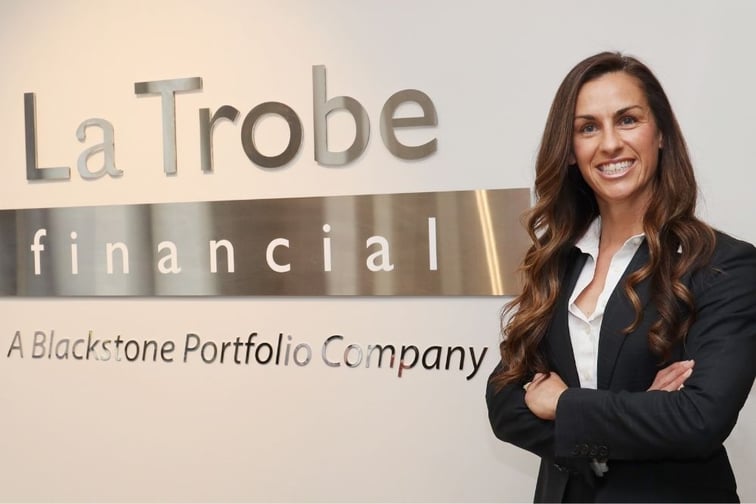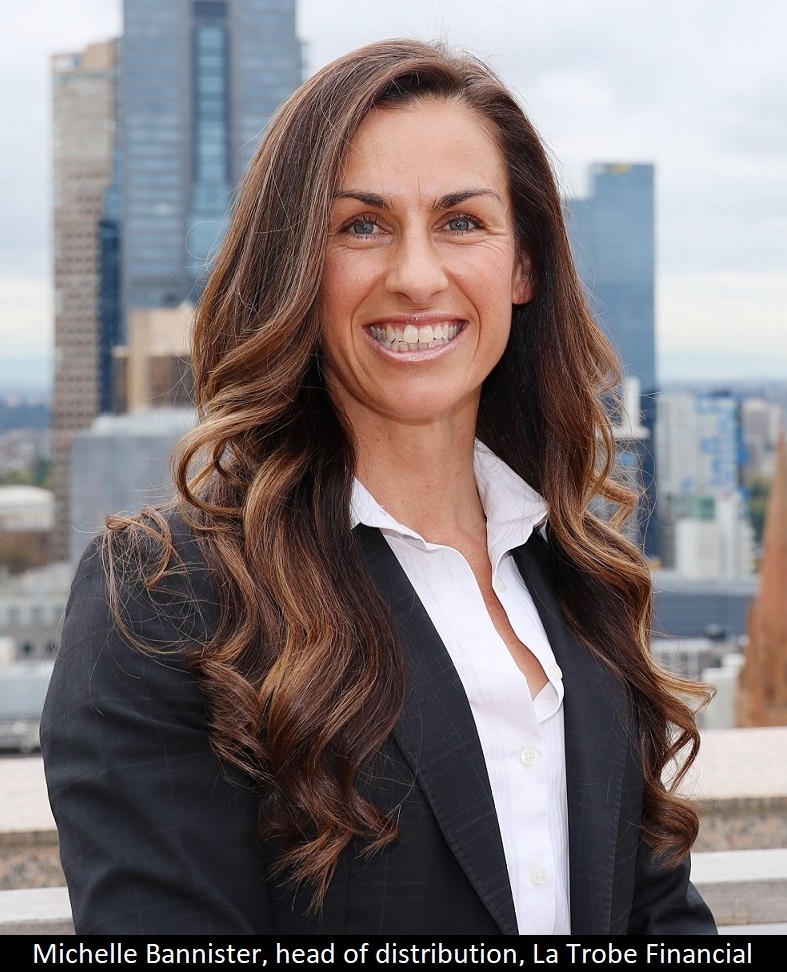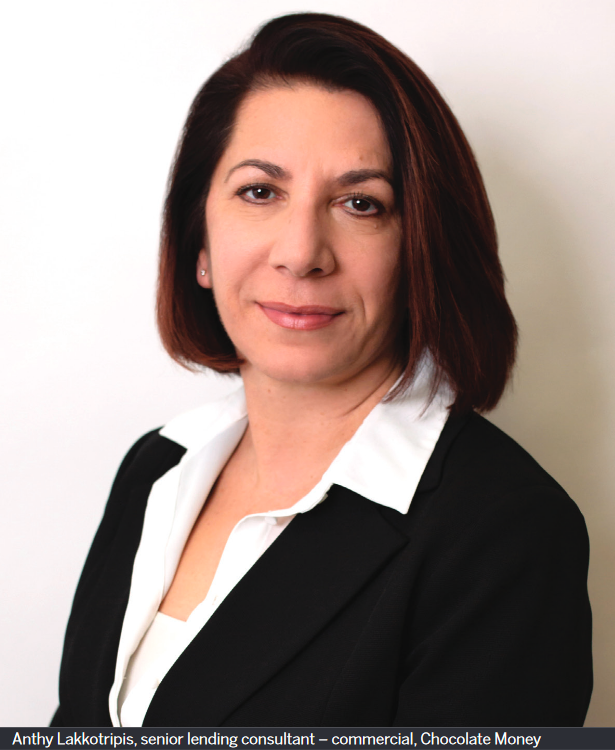

Michelle Bannister is proud of the support she received from La Trobe Financial as she moved up through the ranks into a senior role. Now she wants to encourage more women to choose a career in broking and finance.
Michelle Bannister has been at leading non-bank La Trobe Financial for 24 years and her career path has taken her all the way from the mailroom to senior executive – head of distribution.
“La Trobe Financial’s support has helped me to grow and develop as a person and has offered me a number of opportunities during my career which at that time were traditionally seen as male-dominated roles.”
Bannister (pictured below) says she began her career at La Trobe Financial working in the mailroom after completing a two-week work experience trial – a typical cliché for a young female entering the corporate arena at that time.
 “From there, I progressed to the typing pool, where I was again surrounded by females, but that’s where the cliché ended, which is a great reflection on the culture at La Trobe Financial where hard work gets recognised and opportunities are presented.”
“From there, I progressed to the typing pool, where I was again surrounded by females, but that’s where the cliché ended, which is a great reflection on the culture at La Trobe Financial where hard work gets recognised and opportunities are presented.”
Bannister spent time in collections and then quickly moved into credit, where she realised her strength and passion was in the third party channel, dealing with the brokers.
“I headed up credit for nine years prior to moving into a sales role – which gave me a great foundation along with a high degree of confidence to back my decisions in the field, which is what I built my sales career on,” she says.
La Trobe Financial has always had a focus on employing females, and that hasn’t changed.
“Opportunities are available to everyone – period. If you can prove yourself, and you do the work, the job is yours,” Bannister says.
At the non-bank lender, the number of females entering the workspace is steady and holding at close to par with the number of males.
“In recent times, we have experienced an extremely high calibre of females joining us, often coming out of larger corporate organisations where in some cases they tell us they feel that they lost sight of their future career path and felt more like a number with a limited voice.”
Bannister says what has changed externally is that 20 years ago a typical broker would have been a mature-aged male broker, but that’s no longer the case, as younger women and men have become brokers.
“That’s helped the transition to a greater level of acceptance of females in the industry and a greater deal of respect.”
The industry has also come a long way in accepting and promoting women, Bannister says.
“That wasn’t the case 15 years ago. You look at every industry body back then and it was 100% male dominated; well and truly over 80% of the industry was male.”
Bannister says her move away from an individual sales role to her current role in which she looks after a team of 35 sales people has been rewarding.
“My role now is about helping people under me succeed. I’m proud to have mentored a number of people and assisted them in finding leadership opportunities.”
During her time as head of distribution, Bannister has created a number of state manager roles over the last 12 months, and three of them (NSW, Victoria and Queensland) are held by women. There are also two female state managers in the asset management arm of the business, bringing the total number of females in a sales leadership role to six, out of eight roles.
Three of La Trobe Financial’s state managers are mums.
“It shows to females in the industry that it is possible; as much as it’s a juggle and a balance and hard work, don’t give up your career just because you have the title of being a mum,” Bannister says.
“La Trobe Financial has continued to provide me with great support, encouraging me to strive to be my best, and supporting me both in my day-to-day role and also by allowing me to progress my career whilst raising my young children.”
Bannister says arriving at a female majority within sales leadership roles was not purposeful; it was simply a reflection of the best candidates for the role at the time getting an opportunity, which is evidence of the meritorious culture that exists at La Trobe Financial.
“I feel that we’re set up well to provide even more opportunity for our staff, because the people under the state managers are going, ‘OK, there’s a stepping stone for me. How do I get there? I want that job’.”
The company provides tailored training for its female employees to equip them with useful skills and tips and the confidence to work in what can be a male-dominated industry, Bannister says.
In order to boost female broker numbers, which the MFAA says are at 26.9% – the lowest percentage ever – she says promotion and messaging via industry bodies is needed to show women how broking has changed and now offers work-life balance.
“The way in which a broker was expected to operate 10 to 15 years ago, being nine-to-five minimum in an office five days per week, is no longer the same now, therefore it can appeal more now to females because as long as you’ve got your laptop and phone with you, you can be flexible around your hours,” Bannister says.
“Digitisation of documents and the move towards more online processes have enabled us to become borderless and able to operate from the kitchen table if we need to – this can be of great appeal to working mums and should be promoted.”
Bannister says when it comes to La Trobe Financial helping female brokers, “we feel that our program caters well for all brokers, regardless of gender, to try new products and learn new skills, and have specifically engineered our products to do so”.
“A great example would be in the commercial and development space, where the number of active female brokers is further reduced. We are able to provide a very hands-on approach with training and spend the time with brokers to empower them to ensure they have a high level of confidence to play in this niche market.”
The non-bank also provides great support for ‘women in finance’ events, supplying inspiring female keynote speakers and promoting education aimed at females in the finance industry.
“I am always willing to share my story and experience with other females in the industry if it can help them on their journey,” Bannister says.
 Experienced female broker Anthy Lakkotripis is the senior lending consultant – commercial at Chocolate Money, a Melbourne brokerage specialising in the self-employed and building sectors.
Experienced female broker Anthy Lakkotripis is the senior lending consultant – commercial at Chocolate Money, a Melbourne brokerage specialising in the self-employed and building sectors.
Lakkotripis has been a finance broker for more than 17 years.
“I believe women may tend to shy away from commercial broking especially, as they perceive it as a highly specialised, male-orientated and difficult area to break into,” she says.
“This, coupled with the fact that it can take up to two years before someone can create a truly sustainable income via their pipeline, may discourage some from entering this profession.”
Lakkotripis says the finance industry also presents challenges to women that men won’t necessarily face.
“Women who intend to have children and may need to take time out of the workforce are then faced with a ‘rebuilding stage’ before their income is restored. This can be a major deterrent for many."
Having said all that, a career in broking offers tremendous flexibility and security and can be incredibly rewarding personally and financially. It is especially suited to women who are looking for a balance of career and being a mum.”
While commercial broking is considered highly specialised, Lakkotripis says many of the skills are transferable, and becoming competent is not as onerous as it is portrayed.
“It is important to first highlight the positives and then put systems in place which demonstrate and allow women to identify the skills they already have which can be harnessed and transferred.”
Lakkotripis says the industry should also provide mentoring and peer networking so new brokers can fast-track their knowledge and gain success more quickly.
She says the presence of female brokers will help dispel the “male requirement” myth.
“Having successful women to look up to and be mentored by will indeed give other women entering this industry the confidence to strive for success regardless of any challenges that they may face with ‘old-school operators’.”
